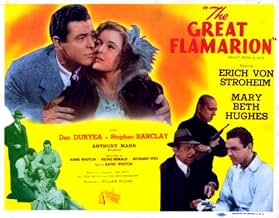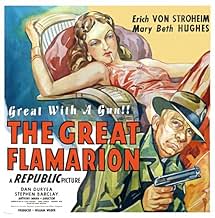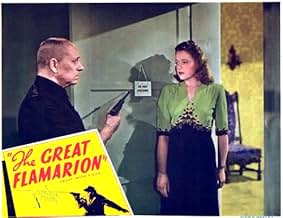AVALIAÇÃO DA IMDb
6,5/10
1,6 mil
SUA AVALIAÇÃO
Parte de um ato de entretenimento, uma artista feminina bonita, mas sem escrúpulos, manipula todos os homens de sua vida para atingir seus objetivos.Parte de um ato de entretenimento, uma artista feminina bonita, mas sem escrúpulos, manipula todos os homens de sua vida para atingir seus objetivos.Parte de um ato de entretenimento, uma artista feminina bonita, mas sem escrúpulos, manipula todos os homens de sua vida para atingir seus objetivos.
- Direção
- Roteiristas
- Artistas
Erich von Stroheim
- The Great Flamarion
- (as Erich Von Stroheim)
Steve Barclay
- Eddie Wheeler
- (as Stephen Barclay)
William A. Boardway
- Audience Member
- (não creditado)
Jack Chefe
- Hotel Desk Clerk
- (não creditado)
Kay Deslys
- Sally Hampton
- (não creditado)
Alphonso DuBois
- Stagehand
- (não creditado)
John Elliott
- Theatrical Agent
- (não creditado)
Jack Evans
- Vagrant on Park Bench
- (não creditado)
Franklyn Farnum
- Stage Manager
- (não creditado)
Tony Ferrell
- Mexican Singer
- (não creditado)
Charles Fogel
- Audience Member
- (não creditado)
Joseph Granby
- Detective Ramirez
- (não creditado)
Bobbie Hale
- Pawn Shop Clerk
- (não creditado)
Avaliações em destaque
Early in his career, Erich Von Stroheim was well known for his temperament and excesses--so much so that his once celebrated career was practically in ruins by the 1940s. Because his star power had faded so, he was forced to act in a few relatively low budget films that were surprisingly good--much better than you'd expect. Part of this was due to Von Stroheim's acting, but it also was fortunate that he was paired with a young but very talented director (Anthony Mann). Because of his success with films like THE GREAT FLAMARION, Mann went on to direct many wonderful films and Von Stroheim had a mild resurgence in his prospects.
The film begins with a murder at a theater in Mexico. A short time later, a badly wounded Von Stroheim is discovered by the lone person still in the theater and Von Stroheim tells his story about why he committed the murder. Since you know that the murder occurred, there isn't a lot of suspense about the whole thing, but the film did a wonderful job of making the viewer actually care about him and understand why he felt compelled to kill this particular woman. The sweet and lovely Connie, you learn, is one horrible lady and her character is exceptionally interesting and gritty--sort of like an evil Noir femme fatale. She is so compelling to watch that this helps to elevate the film well above the ordinary.
Overall, a very entertaining film that nearly earns an 8. Fascinating character studies and a great script help make this one a keeper.
The film begins with a murder at a theater in Mexico. A short time later, a badly wounded Von Stroheim is discovered by the lone person still in the theater and Von Stroheim tells his story about why he committed the murder. Since you know that the murder occurred, there isn't a lot of suspense about the whole thing, but the film did a wonderful job of making the viewer actually care about him and understand why he felt compelled to kill this particular woman. The sweet and lovely Connie, you learn, is one horrible lady and her character is exceptionally interesting and gritty--sort of like an evil Noir femme fatale. She is so compelling to watch that this helps to elevate the film well above the ordinary.
Overall, a very entertaining film that nearly earns an 8. Fascinating character studies and a great script help make this one a keeper.
Von Stroheim is superbly cast as a stage sharpshooter who succumbs to the charms of his scheming assistant. Though some may not appreciate the actor's ramrod-spined, Teutonic demeanor, such bearing is useful in the portrayal of stoicism and all the pitfalls that it engenders. Von Stroheim's dearth of emotionality makes all the more credible his character's inability to discern the falseness of personalities, and there is a unique poignancy in watching him go through the paces of a festering realization of perfidy. The plot, however, is pedestrian and, related in flashback, all the more predictable. Von Stroheim mavens should appreciate the movie, though, as should devotees of Dan Duryea, who plays a hard-drinking, done-wrong hoofer.
The Great Flamarion is directed by Anthony Mann and collectively written by Anne Wigton, Heinz Herald, Richard Weil and Vicki Baum. It stars Erich von Stroheim, Mary Beth Hughes, Dan Duryea, Stephen Barclay, Lester Allen and Esther Howard. Music is by Alexander Laszlo and cinematography by James S. Brown Jr.
Back stage of a vaudeville show and a woman is killed, the perpetrator of the crime escapes up into the rafters. Soon he falls to the ground, and cradled by one of the stage employees, he tells a story of lust, deceit, murder and broken hearts...
Though it falls into a familiar subset of film noir that encompasses the obsessive dupe, reference Criss Cross, The Killers, Scarlet Street et al, Anthony Mann's film has a most interesting structure. Story is essentially told from the mouth of a dying man, his guilt set in stone, we spin to flashbacks and narration as The Great Flamarion (Stroheim) himself clues us in to the dangers of not following your brain, but what's in your underwear.
Flamarion, wonderfully essayed by the acid faced Stroheim, is a sharp-shooter on the vaudeville circuit. Once burned in love years previously, he now lives only for his work and he's friendless, miserable and intolerable to work for. His two assistants are husband and wife team Connie (Hughes) and Al (Duryea) Wallace, he's a drunk and she's out for what she can get, and what she wants at this moment in time spells trouble for Flamarion and Al. So begins a treacherous tale as a once wise and closed off man falls hook, line and sinker for a pair of shapely legs young enough to be propping up his daughter.
Connie Wallace (Hughes excellent) is one of the classic femme fatales, she's not just duping one man, not even two, her capacities for feathering her own nest are enormous. Watching her break down Flamarion's walls is pitch black stuff, as is Flamarion's pitiful descent into becoming a broken man, while Duryea's (another in his long line of great film noir losers) Al roams the edges of the frame as a pitiful drunk stumbling towards doom. The dialogue may not always catch the mood right, but as a story, performed and written, it's clinical noir.
Out of Republic Studios, there's obviously budget restrictions, but Mann was a shrewd director in noir circles and crafts a tight and crafty picture. It's never overtly expressionistic but the all round effect garnered by the lighting techniques pumps the haunting like tale with atmosphere. There's also a gentle pulse of sexual politics in the narrative, and saucy suggestion as well, with the director asking us to peek under the curtain to spy a world of horny sad-sacks and dangerous females.
It's not front line Mann or as good as Scarlet Street (released after The Great Flamarion), but it is a little noir gem. With top performances, pitch black plotting and a message that tells us to never take our eye off the ball, it's very much recommended to the film noir faithful. 8/10
Back stage of a vaudeville show and a woman is killed, the perpetrator of the crime escapes up into the rafters. Soon he falls to the ground, and cradled by one of the stage employees, he tells a story of lust, deceit, murder and broken hearts...
Though it falls into a familiar subset of film noir that encompasses the obsessive dupe, reference Criss Cross, The Killers, Scarlet Street et al, Anthony Mann's film has a most interesting structure. Story is essentially told from the mouth of a dying man, his guilt set in stone, we spin to flashbacks and narration as The Great Flamarion (Stroheim) himself clues us in to the dangers of not following your brain, but what's in your underwear.
Flamarion, wonderfully essayed by the acid faced Stroheim, is a sharp-shooter on the vaudeville circuit. Once burned in love years previously, he now lives only for his work and he's friendless, miserable and intolerable to work for. His two assistants are husband and wife team Connie (Hughes) and Al (Duryea) Wallace, he's a drunk and she's out for what she can get, and what she wants at this moment in time spells trouble for Flamarion and Al. So begins a treacherous tale as a once wise and closed off man falls hook, line and sinker for a pair of shapely legs young enough to be propping up his daughter.
Connie Wallace (Hughes excellent) is one of the classic femme fatales, she's not just duping one man, not even two, her capacities for feathering her own nest are enormous. Watching her break down Flamarion's walls is pitch black stuff, as is Flamarion's pitiful descent into becoming a broken man, while Duryea's (another in his long line of great film noir losers) Al roams the edges of the frame as a pitiful drunk stumbling towards doom. The dialogue may not always catch the mood right, but as a story, performed and written, it's clinical noir.
Out of Republic Studios, there's obviously budget restrictions, but Mann was a shrewd director in noir circles and crafts a tight and crafty picture. It's never overtly expressionistic but the all round effect garnered by the lighting techniques pumps the haunting like tale with atmosphere. There's also a gentle pulse of sexual politics in the narrative, and saucy suggestion as well, with the director asking us to peek under the curtain to spy a world of horny sad-sacks and dangerous females.
It's not front line Mann or as good as Scarlet Street (released after The Great Flamarion), but it is a little noir gem. With top performances, pitch black plotting and a message that tells us to never take our eye off the ball, it's very much recommended to the film noir faithful. 8/10
This is a decent little movie with a really nasty woman. She is really quite beautiful, and in the Blue Angel tradition, makes a man twice her age and not all that attractive, fall for her. There's no fool like an old fool and you don't mess with Von Stroheim. I wasn't aware that the great actor/director made some pretty weak films over the years. This one survives pretty well. Von Stroheim plays Flamarion, a trick shot artist, who is in great demand. He gets into the business of an alcoholic and his cheating wife. She uses him, changes him, and then he wants revenge. The story is told by Flamarion as another vaudeville performer holds him in his arms as he dies. It is told in flashback. I have to admit knowing that things had no possibility of working out, yet because of the interesting nature of the characters, particularly the young woman (who is beautiful, even by modern standards). Those of us who have had those yearnings to be young again and have a second chance can easily sympathize as this man makes mistake after mistake; loving too much; trusting too much. I was fairly impressed by the movie.
"The Great Flamarion" is an undiscovered little gem of a film from Rebublic that features von Stroheim as the title character, a cold and arrogant vaudeville performer who specializes in sharp shooting. He is assisted in his act by Connie and Al Wallace, a seemingly happy couple. When Connie professes her love for Flamarion and tells of her husband's abusive nature and hard-drinking, Flamarion eventually opens his heart to this femme-fatale, played to the hilt by Mary Beth Hughes, a most underrated actress, who toys with men in the tradition of film noir greats such as Joan Bennett in "Scarlet Street," Jane Greer in "Out of The Past," and Yvonne DeCarlo in "Criss Cross." When Connie suggests that Flamarion accidentally hit Al, portrayed by the always terrific Dan Duryea, during their gun skit, Flamarion's life changes forever. Anthony Mann's direction is taut and economic. The film, told through flashbacks, captures the desperation and loneliness of a man willing to do anything for love. Next to "Sunset Boulevard," this is one of von Stroheim's finest hours as an actor. He allows himself to show joy and vulnerability as he never has before on screen.
Você sabia?
- CuriosidadesA Grande Paixão (1945) marked the debut of William Wilder as a motion picture producer. Wilder, who was sometimes credited as W. Lee Wilder on his later films, was an "eastern industrialist," according to a September 1944 Hollywood Reporter news item, and was the brother of director Billy Wilder.
Billy Wilder rarely talked about his brother, and when he did the theme was always the same: "A dull son of a bitch," Billy said of him in 1975. Years later he called him "a fool" who thought he could make it in Hollywood simply because his more famous brother had.
- Erros de gravaçãoDuring his act, the Great Flamarion fires more shots than the gun can store.
- Citações
Connie Wallace: You know, no matter how fast you drink it the distilleries can still stay way ahead of you.
Al Wallace: Yup. But by next week I'll have 'em workin nights to do it!
- ConexõesEdited into Muchachada nui: Episode #2.11 (2008)
- Trilhas sonorasChita
by Faith Watson
Principais escolhas
Faça login para avaliar e ver a lista de recomendações personalizadas
- How long is The Great Flamarion?Fornecido pela Alexa
Detalhes
- Data de lançamento
- País de origem
- Centrais de atendimento oficiais
- Idioma
- Também conhecido como
- The Great Flamarion
- Locações de filme
- Empresa de produção
- Consulte mais créditos da empresa na IMDbPro
- Tempo de duração1 hora 18 minutos
- Cor
- Proporção
- 1.37 : 1
Contribua para esta página
Sugerir uma alteração ou adicionar conteúdo ausente

Principal brecha
By what name was A Grande Paixão (1945) officially released in India in English?
Responda
































